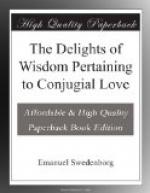ON REPEATED MARRIAGES, n. 317-355.
After the death of a married partner, again to contract wedlock, depends on the preceding conjugial love, n. 318. After the death of a married partner, again to contract wedlock, depends also on the state of marriage in which the parties had lived, n. 319. With those who have not been in love truly conjugial, there is no obstacle or hindrance to their again contracting wedlock, n. 320. Those who had lived together in love truly conjugial, are unwilling to marry again, except for reasons separate from conjugial love, n. 321. The state of a marriage of a youth with a maiden differs from that of a youth with a widow, n. 322. Also the state of marriage of a widower with a maiden differs from that of a widower with a widow, n. 323. The varieties and diversities of these marriages, as to love and its attributes, are innumerable, n. 324. The state of a widow is more grievous that that of a widower n. 325.
ON POLYGAMY, n. 332-352.
Love truly conjugial can only exist with one wife, consequently neither can friendship, confidence, ability truly conjugial, and such a conjunction of minds that two may be one flesh, n. 333, 334. Thus celestial blessedness, spiritual satisfactions, and natural delights, which from the beginning were provided for those who are in love truly conjugial, can only exist with one wife, n. 335. All those things can only exist from the Lord alone; and they do not exist with any but those who come to him alone, and live according to his commandments, n. 336. Consequently love




